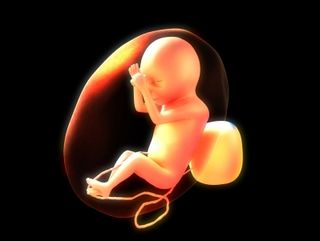Memories in the Womb as a Baby Voices
Fetuses Have Memories

You probably recall little of your days in the womb, but a new written report suggests that brusk-term memory may be present in fetuses at 30 weeks of age. Until a few decades ago, "people would say that the human fetus is a sort of black box," said Dr. Jan Nijhuis, a co-writer of the study and an obstetrician at Maastricht University Medical Center in Kingdom of the netherlands. Studies over the years accept started to reveal more about the neurological development of humans before they are born, just researchers are yet trying to effigy out when retentivity begins and how long it can last. The new study tested how fetuses in nearly 100 pregnant women responded to a specific stimulus, in this case, a "vibroacoustic stimulation," which is a very depression audio that makes a vibration. The researchers observed the reaction using an ultrasound. When the fetus first receives the stimulation, information technology is startled. But after repeated trials of the same stimulation, thirty seconds apart, the fetus gets used to the sound and doesn't react. "A normal fetus, of about 30 or 32 or 34 weeks, would stop responding after [about] xiii or 14 stimuli," said Nijhuis. This lessened response to a repeated stimulus is called habituation, a process that both humans and animals are known to experience. For instance, you might become habituated to the sound of your heater at nighttime, hearing it at first, only growing used to the noise subsequently a while and falling asleep, Nijhuis explained. "Habituation is a grade of learning and a form of retentiveness," Nijhuis said. He and his colleagues used the habituation tests to examine retentiveness in fetuses 30 to 38 weeks erstwhile. They found that 30-week-onetime fetuses had a "retentivity" of x minutes — if the fetuses received a 2d round of sound stimulation 10 minutes after the initial test, it took them a lot less time to go habituated to the noise during their second session, and they stopped responding afterward only a few stimuli, he said. The researchers too found that 34-calendar week-old fetuses were able to "store information and retrieve it 4 weeks afterward," he said. The team came to this determination afterward performing the habituation tests at 34 weeks and and then again at 38 weeks. The scientists compared the response of the 38-week-erstwhile fetuses who had been tested before with that of fetuses who had not been tested before. "We saw this hit difference," Nijhuis said. "The fetuses who had been tested before were habituated within ii or three or 4 stimuli, and the other fetuses of 38 weeks responded in the aforementioned way every bit [32 week-old fetuses who had non been tested before]," meaning it took many more stimuli to habituate the 38-week-sometime fetuses if they had non previously experienced the examination at 34 weeks. "So that shows that there is a sort of remembrance of four weeks," he said. Previous enquiry has shown that fetuses can habituate to sounds and that the fetus has a short-term memory of 24-hours, but this written report further examined how long these memories can last. Fetuses younger than 30 weeks do not seem to be able to habituate, Nijhuis said, although this may be because the scientists are not using the right type of stimulus, he said. Futurity research will work on refining their current protocol to test habituation at different times during fetal development. Since fetuses that accept developmental problems take longer to habituate than normal fetuses, these types of studies may help indicate fetuses that are at risk for certain conditions. The results were published in the July/August outcome of the periodical Child Development.
- Do fetuses feel hurting? What the science says
- Home test for fetus gender raises abortion concerns
- Survival of the fetus: Why males have it so rough
Source: https://www.livescience.com/5585-fetuses-memories.html

0 Response to "Memories in the Womb as a Baby Voices"
Post a Comment